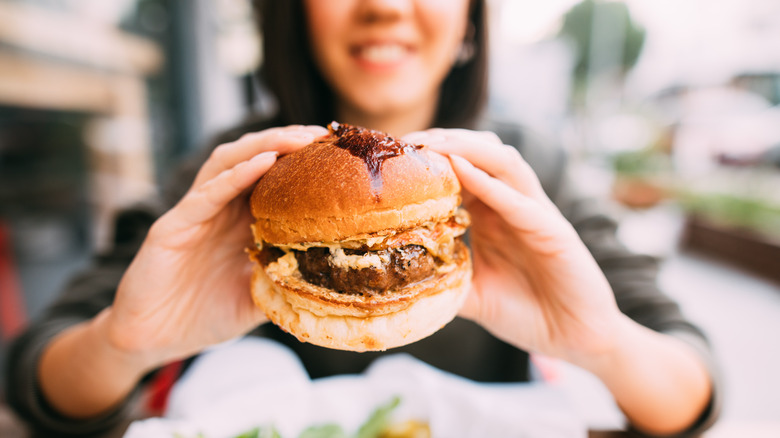When You Cram Your Daily Protein Intake Into One Meal, This Is What Happens
You need protein every day to help your body build muscles and bones, repair tissues, make enzymes for your digestion, and regulate your hormones. A meal with protein will help you feel more satisfied, so you eat less (per Piedmont Healthcare). You don't need to overload on protein, according to Harvard Medical School. About 10% of your daily calories should come from a variety of protein sources, rather than just red meat. Consider fish, dairy, or plant-based sources like seeds, nuts, and beans.
Heavy exercisers and bodybuilders might need a little more protein to build muscle and improve recovery, but most people shouldn't eat more than 2 grams of protein per kilogram of body weight. That's 136 grams a day for someone weighing 150 pounds. Rather than cramming all your protein into a single meal, a 2018 study in the Journal of the International Society of Sports Nutrition says to spread your protein intake over four meals if you're aiming for the maximum amount of protein in a day. That comes to about 34 grams of protein for a 150-pound person. If you eat your daily protein in one meal, such as dinner, you could stress your kidneys and possibly gain weight.
Your body can't use too much protein at once
Your body needs certain nutrients to meet the demands of the moment. You don't need a heavy meal if you've been sitting around all day using very little energy, but you probably need a good amount of protein if you're recovering from a hard workout. While carbohydrates can be stored as glucose for energy or fat, too much protein that your body doesn't need gets stored as fat, especially if you're not very active. Your source of protein could also affect your cholesterol levels. In particular, most animal protein sources will also have a significant amount of artery-clogging fat (per the Mayo Clinic).
Per the National Kidney Foundation, your kidneys work to remove excess protein and filter out waste from your body, and you'll make them work overtime if you pile on more protein during a single meal. The waste from processing protein can build up; this could mean more trips to the bathroom as your kidneys rid your body of waste.
Although your body can absorb a lot of protein at once, a 2018 study in the International Society of Sports Nutrition said that eating too much at once can affect the absorption of fewer concentrated amino acids in the body. The study suggested mixing different types of protein sources, such as fast-digesting whey with slower-digesting casein so that you can maximize the absorption of the nutrients you need.
Be careful about eating too much protein
High-protein diets have been effective for weight loss, according to a 2021 study in the American Journal of Clinical Nutrition. The researchers had people eat 40% of their daily calories from protein, 35% carbs, and 25% fat. Compared to a diet with 15% protein, 55% carbs, and 30% fat, the high-protein diet burned more fat and produced more energy.
Some high-protein diets promise weight loss by eating as much as 400 grams of protein a day. Eating too much protein might also cause problems for people with kidney issues, according to a 2019 article in Nephrology Dialysis Transplantation. High-protein meals put pressure on your kidneys through a process called glomerular hyperfiltration, where the surge in amino acids causes the kidneys to expand. People who have kidney issues or are at risk for chronic kidney disease should follow a low-protein diet.
According to Medical News Today, too much protein than what your body needs could also cause dehydration, fatigue, or headaches. Over time, you could develop cardiovascular disease, blood vessel disorders, and seizures.



